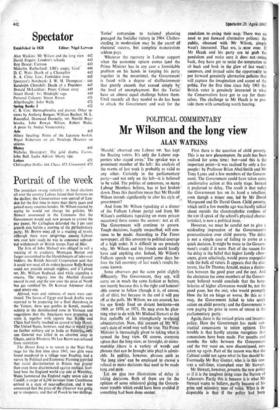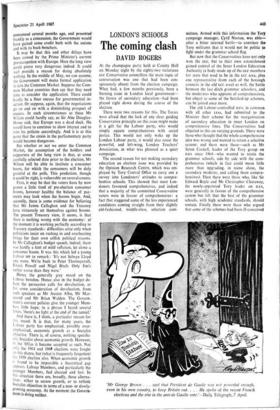Mr Wilson and the long view
POLITICAL COMMENTARY ALAN WATKINS
'Harold,' observed one Labour MP, 'has kept- the floating voters. It's only the Labour sup- potters-who stayed away.' The speaker was a prominent member of the left: his analysis of the events of last week is probably as valid as any other. Certainly in the parliamentary party—and not only on the left—it is believed to be valid. The politics of consensus, so many Labour Members believe, has at last broken down. Does this therefore mean that Mr Harold Wilson intends significantly to alter his style of government?
And from Mr Wilson (speaking at a dinner ' of the Fulham Labour party) and from Mr Wilson's confidants (speaking on more private occasions) there comes the answer: not at all. The Government will continue to govern. Tough decisions, happily unspecified, will con- tinue to be made. According to The Times newspaper, all this amounts to political courage of a high order. It is difficult to see precisely why. Mr Wilson and his friends could hardly have said anything else. Indeed, Mr Wilson's Fulham speech was composed some days be- fore the full enormity of last week's results be- came known.
a Some observers put the same point slightly differently. The Government, they say, will carry on in much the same fashion as before, not merely because this is the right and honour-' able course to follow (though it is, of course, all of this), but because in the end it will pay off at the polls. Mr Wilson, we are assured, has his eye firmly fixed on distant horizons—on 1969, or 1970, or 1971. He may even be plan- ning what to do with Mr Michael Stewart at the first reshuffle of his triumphantly re-electg4 administration. Now, this account of Mr Wil- son's state of mind may well be true. The Prime Minister is increasingly given to taking what is termed the long view. Of course, everyone agrees that the long view, or foresight, or states- manship (there is a variety of words and phrases that can be brought into play) is admir- able. In politics, however, phrases such as 'the long view' can be employed to excuse a refusal to make decisions that need to be made here and now.
Let me give two illustrations of delay in taking decisions. Both of them are (in the opinion of some ministers) giving the Govern- ment trouble which could have been avoided if something had been done sooner. First there is the question of child poverty. This is no new phenomenon. Its scale has been realised for some time: but—and this is the important point—it was realised by only a few people: by Professor Brian Abel-Smith and Mr Tony Lynes and a few members of the Govern- ment. The Government could have taken some ameliorative action at this early stage. Instead
it preferred to delay. The result is -that today the Government has on its hand a rebellion, even though a minor one, led by Mr David Marquand and Dr David Owen. Child poverty, which until a few months ago was hardly talked about outside the claustrophobic confines of the LSE speak of the school's physical charac- teristics), is now a political issue. - However, we must be careful not to give a misleading impression of the Government's procrastination over child poverty. The delay is not a simple case of failing to arrive at a quick decision. It might be more to the-Govern- ment's credit if it were. Part of the reason for the delay is the belief that higher family allow- ances, given selectively, would prove unpopular with the bulk of voters. It appears that the elec- torate, like Dr Thomas Arnold, makes a distinc- tion between the good poor and the rest. And the electorate (so some members of the Govern- ment believe) would conclude that the bene- ficiaries of higher allowances would be, not thL good poor, but the rest, who would promptly blow the lot on bingo or worse. Be this as it may, the Government failed to take quick action on child poverty; and the Government is now paying the price in terms of unrest in th- parliamentary party,.
Again, there is the revised prices and incomes policy. Here the Government has made sub- stantial concessions to union opinion. Thy trouble is that hardly anyone recognises that concessions have been made. For months and months the talks between the Government and the TUC went on, now discontinued, now taken up again. Part of the reason was that the Cabinet could not agree what its line should be. Eventually Mr Ray Gunter, who is in this con- text a soft-liner, triumphed over Mr Stewart.
Mr Stewart, however, presents the new policy as if it is the toughest thing since the Statute of Labourers. Partly this is because it is what Mr Stewart wants to believe, partly because of his prim and minatory tone of voice. What is in- disputable is that if the policy had been
announced several months ago, and presented frankly as a concession, the Government would have gained some credit both with the unions and with its back-benchers.
It may be that this and other delays have been caused by the Prime Minister's current pre-occupation with Europe. Here the long view could prove very dangerous indeed. It could well provide a reason for doing absolutely nothing. In the middle of May, we can assume, the Government will make formal application to join the Common Market. Suppose the Com- mon Market countries then say that they need time to consider the application. There could hardly be a finer excuse for governmental in- action. Or suppose, again, that the negotiations go on and on with a diminishing prospect of success. In such circumstances as these Mr Wilson could hardly say, as Sir Alec Douglas- Home said, that Europe was a dead duck. He would have to continue to show interest_and to trim his policies accordingly. And it is at this point that the strain in the parliamentary party would become dangerous.
But whether or not we enter the Common Market, the assumption of the holders and supporters of the long view is that, at some carefully selected date prior to the election, Mr Wilson will be able to institute a consumer boom, for which the consumers will be duly grateful at the polls. This prediction, though it could be right, is vulnerable on several counts.
First, it may be that the voters have by now grown a little tired of pre-election consumer booms, however healthy the balance of pay- ments may look when the booms begin. And, secondly, there is some evidence for believing that Mr James Callaghan and the Treasury have virtuously set themselves against booms. The present Treasury view, it seems, is that there is nothing wrong with the economy: at the moment it is working perfectly according to Treasury standards: difficulties arise only when politicians insist on rushing in and overheating things for their own selfish political reasons. In Mr Callaghan's budget speech, indeed, there was hardly a hint of mild reflation, let alone a consumer boom. It was this which led a young Labour MP to remark: 'It's not Selwyn Lloyd any more. We're back to Peter Thorneycroft, Enoch Powell and Nigel Birch. Only Jim's rather worse than they were.'
Hence the generally grey mood on the Labour benches. Hence also in the budget de- bate the persuasive calls for devaluation, or for some consideration of devaluation, from such speakers as Mr Austen Albu, Mr Mar- quand and Mr Brian Walden. The Govern- ment's current policies give the younger Mem- bers little hope; in a phrase I heard several times, 'there's no light at the end of the tunnel' And there is, I think, a particular reason for this mood. It is that, for many years, the Labour party has emphasised, possibly over- emphasised, economic growth as a Socialist objective. There is, of course, nothing specific- ally Socialist about economic growth. However, in the 'fifties it became accepted as such. Not only the 1964 and 1960 elections were fought on this theme, but (what is frequently forgotten) the 1959 election also. When economic growth is found to be impossible a theoretical gap appears. Labour Members, and particularly the younger Members, feel cheated and lost. In this situation there are, broadly, these alterna- tives: either to secure growth, or to rethink Socialist objectives in terms of a non- or slowly- growing economy. At the moment the Govern- ment is doing neither.







































 Previous page
Previous page